Birds Kept as Pets
Information about baby chicks kept as pets can be found on the backyard poultry page.
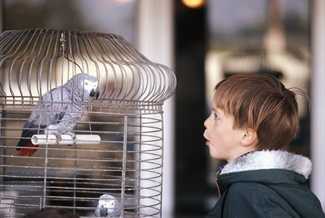
Boy admiring an African parrot.
Credit: CDC thanks Chrislyn Wood DVM, a poultry specialist at USDA for her careful review of these pages.
Feathered pets can be brightly colored and fascinating additions to the family. Estimates say that over 5 million households in the United States have pet birds. Bird owners should be aware that although their pets might be highly intelligent and clean companions, they can carry germs that make people sick.
Germs from birds can cause a variety of illnesses in people, ranging from minor skin infections to serious illnesses. These illnesses are rare in the United States, but it's better to be safe and take steps to keep yourself and your birds healthy.
One of the best ways you can protect yourself from getting sick is to thoroughly wash your hands with running water and soap after you touch birds or their droppings. With routine veterinary care and some simple health tips, you are less likely to get sick from touching, petting, or owning birds.
Click the tabs above for more information about choosing birds, a list of diseases people can get from birds, and information on how to keep yourself and your birds healthy.
Diseases associated with birds kept as pets that cause human illness include:
Cryptococcosis (Cryptococcus neoformans)
Cryptococcosis is a fungus whose spores can be found in soil contaminated with pigeon droppings. Signs of cryptococcosis are rare in birds.
People get cryptococcosis by breathing in contaminated dust or getting it in open wounds. In humans, symptoms resemble pneumonia and include shortness of breath, coughing, and fever. Skin infections involving Cryptococcus can also occur. Infants, elderly persons, and those with weakened immune systems can have more serious infections.
Histoplasmosis (Histoplasma capsulatum)
Histoplasmosis is a fungal disease that is spread to people when they breathe in dust from pigeon or bat droppings. Birds do not get sick from exposure to histoplasmosis.
Very few people become infected with histoplasmosis. People who do become ill tend to develop pneumonia-like symptoms within 1–3 weeks of exposure: fever, chest pains, and a dry or nonproductive cough. Infants, older people, and those with weakened immune systems are more susceptible to the fungus and might develop more serious illness.
Mycobacterium avium complex (MAC, Avian Tuberculosis)
MAC is a bacterial disease spread to people from birds and other animals through the environment. Affected birds can become depressed, thin, and weak, and might have diarrhea. Birds carrying this disease shed large amounts of the bacteria into the environment.
Experts believe that people get MAC through exposure to the bacteria in the environment, though it is not clear exactly how the bacteria are transmitted. This disease primarily affects people with a weak immune system. Affected people might lose weight, have abdominal pain or diarrhea, and be anemic or feel tired.
Parrot Fever (Psittacosis; Chlamydiophila psittaci)
Parrot fever is a bacterial disease that people can get after accidentally breathing in secretions of infected psittacine birds, including parrots and parakeets, or poultry and wild birds. Birds might or might not show signs of illness from parrot fever.
People who become sick with parrot fever might have fever, chills, headache, muscle aches, difficulty breathing, and a dry cough. Symptoms usually begin 5–14 days after exposure but can take years to appear. Infants, the elderly, and those with weakened immune systems are more susceptible to parrot fever and might develop more serious illness.
In this section
Healthy Habits: Wash your hands whenever you play or work with birds

Person washing their hands with soap and water.
-
Wash your hands thoroughly with soap and water
- right after handling birds, their toys, food and water dishes, or other equipment.
- after cleaning bird cages or perches.
- before you eat, drink, or smoke.
- Adults should supervise hand washing for young children.
- Use hand sanitizer if soap and water are not readily available. Be sure to have hand sanitizer readily available near the bird's enclosure to encourage guests and children to use hand sanitizer after handling birds.
Before choosing a pet bird
- Check your state, local, and property laws before adopting or purchasing a pet bird. Many governments have ordinances against certain pets because of noise, size, or public health risk.
- Identify a local veterinarian who has experience with pet birds to help you keep your bird healthy.
- Find out what types of birds are suitable for your family. Certain types of birds, like young poultry, might not be suitable for young children or people with weak immune systems who are living in the household.
- Learn about the different types of birds and their personalities and attention needs before you bring one home. Birds are very intelligent and social animals that require a lot of attention.
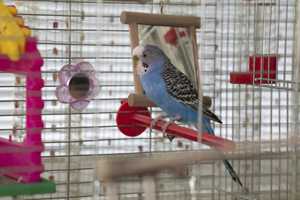
Budgie bird perched in an enriching environment.
- Research how to properly care for your bird before purchase. Ask your veterinarian about the proper food, care, and enclosure or environment that is best for the bird you are selecting.
- Select a location for your bird’s cage or enclosure. Pet birds need to be housed in a warm, draft-free location that has adequate lighting and is close to activity in the household.
- Be aware that pet birds can shed germs in their droppings. Plan to wear gloves when cleaning bird cages, and wash your hands thoroughly after any contact with the birds or their environment.
Importing pet birds into the United States
- USDA regulates the importation of pet birds. Because of the risk of avian influenza (bird flu), USDA restricts the importation of pet birds from certain countries and enforces a 30-day quarantine for all imported birds except those that come from Canada. People interested in importing pet birds should visit the USDA non-US Origin Pet Bird Importation website.
Choosing a bird
- Match a bird's attitude, temperament, size, and activity level with your family, your home, and the amount of time you have to spend with your pet.
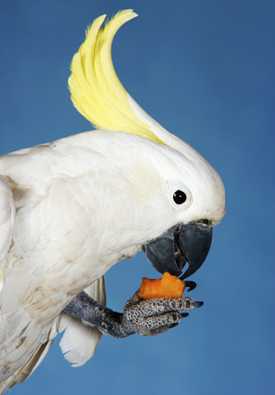
Alert cockatoo eating.
- Pick birds that are bright, alert, and active. Birds should have smooth, sleek, and soft feathers that are free of debris or droppings. Birds who seem depressed, aren't moving around very much or look dirty may be ill.
- Learn the signs of illness in a bird, which include appearing sluggish or depressed, having ruffled feathers or areas of feather loss, abnormal breathing, and fluid running from its eyes or nose.
- When bringing new birds to a household that already has pet birds, be sure to keep the new birds separated for at least 30 days before introducing them to your existing birds. This will help prevent the new birds from passing disease to your existing animals. During this period of separation:
- Wash your hands with soap and water before working with each group of birds.
- Keep water and food dishes, toys, and other cage/perch equipment separate and clean.
- Within a few days after you buy or adopt your bird, take it to a veterinarian who has experience with pet birds for a health visit and get advice on caring for your new pet. Return to the veterinarian for checkups and beak, nail, or wing trimmings, as recommended.
Housing pet birds
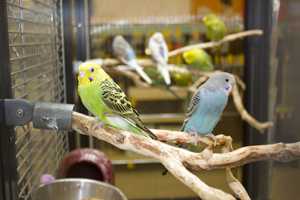
Large bird enclosure for birds to fly.
- Provide a safe, sturdy enclosure or cage for your bird. Keep pet birds from interacting with all wild animals and insects. These animals and insects can carry diseases that can be spread to your pet birds.
- Do not allow your birds to fly or roam around the house unattended. They could get accidentally trapped or hurt.
- Avoid housing pet birds in areas where food or drink is prepared, served, or stored, such as kitchens or dining rooms.
- Don't let your birds play or be housed close to your reptile pets. Reptiles can pass Salmonella to birds.
- Closely supervise any interaction of your birds with other pets to make sure your birds or the animals don't become injured in case of a fight.
Cleaning and disinfecting
- Keep bird cages and enclosures clean to prevent the build-up of animal droppings. When cleaning droppings and cages, use disposable gloves, do not pick up droppings with your bare hands, and make sure to wash your hands thoroughly afterwards.
- Clean bird cages and perches outside with a bottle of dish soap dedicated to this purpose, and use clean water.
- Disinfect bird cages after cleaning with either a dilute bleach solution, diluted properly according to label directions, or a commercial disinfectant made specifically for bird cages.
- Don't clean any equipment or materials in the kitchen sink: This includes cages and feed and water containers. Bacteria and other germs can contaminate your food preparation areas.
- Rinse all cages and equipment well after cleaning. To keep your pet birds safe, it is important to rinse off all of the cleaning and disinfectant residue.
Monitoring your pet's health
- Visit a veterinarian who has experience with pet birds for routine check-ups to keep your bird healthy and prevent infectious diseases.
- If your bird becomes sick or dies within a month after purchase or adoption:
- Contact your veterinarian.
- Inform the pet or feed store, breeder, or adoption organization about the bird's illness or death.
- Consider waiting before you purchase or adopt another pet to give yourself time to clean any germs out of the cage or perch and to clean bird equipment.
- Do not reuse the cage or enclosure until it has been properly cleaned and disinfected.
- Even though a bird is healthy, it can still spread germs to humans and other animals. If you become sick shortly after purchasing or adopting a bird, make sure to tell your doctor about your new pet.
Bird bites and scratches
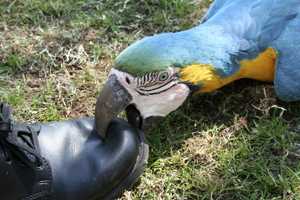
Parrot biting boot.
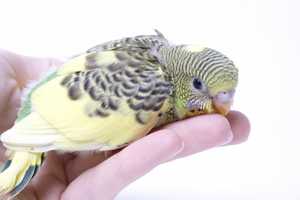
Young budgie bird bites woman's hand.
Pet birds do not have teeth, but their beaks can still cause a lot of damage if they bite or attempt to bite you. Birds can also have very sharp claws, nails, and talons. Germs can spread from bird bites and scratches, even when the wound does not seem deep or serious. If you are bitten or scratched by a bird, you should:
- Wash wounds with soap and water immediately.
- Seek medical attention
- if the bird appears sick
- if the wound is serious (uncontrolled bleeding, loss of function, extreme pain, muscle or bone exposure)
- if the wound becomes red, painful, warm, or swollen, or
- if it has been more than 5 years since you got your last tetanus shot.
If you seek medical attention, make sure to tell your doctor you were bitten or scratched by a bird.
Publications and Materials
Find a veterinarian who specializes in bird medicine
Association of Avian Veterinarians (AAV)
Brochures
Selecting a Bird
American Veterinary Medical Association
Websites
Animal and Animal Product Import Information
U.S. Department of Agriculture, Animal and Plant Health Inspection Service (USDA/APHIS)
Non-U.S. Origin Pet Birds
U.S. Department of Agriculture, Animal and Plant Health Inspection Service (USDA/APHIS)
AVMA market research statistics
American Veterinary Medical Association
Helpful books and references
Compendium of Measures to Prevent Disease Associated with Animals in Public Settings, 2011
National Association of State Public Health Veterinarians, Inc. (NASPHV).
Morbidity and Mortality Weekly Report (MMWR)
Recommendations and Reports. May 6, 2011 / 60(RR04);1-24
Hypersensitivity pneumonitis [bird fancier's lung]
A.D.A.M. Medical Encyclopedia., PubMed Health
Angulo FJ, Glaser CA, Juranek DD, et al. Caring for pets of immunocompromised persons. J Am Vet Med Assoc 1994;205:1711-8.
Parrot fever (psittacosis):
Chlamydiosis in Birds [PDF – 2 pages]
Fact sheet. National Association of State Public Health Veterinarians
Psittacosis/Avian Chlamydiosis [PDF – 6 pages]
Fact sheet. Iowa State University, Center for Food Security and Public Health
Psittacosis in birds and people, 2004 [PDF – 2 pages]
Public Health Fact Sheet. Massachusetts Department of Public Health
Pneumonia: Psittacosis
Site. CDC
Psittacosis
Medline Plus, U.S. National Library of Medicine, National Institutes of Health
Psittacosis Control Guidelines for Local Health Departments [PDF – 5 pages]
Virginia Department of Health
Psittacosis
Fact sheet. Washington State Department of Health, Public Health-Seattle and King County
Psittacosis
Site. WebMD Emedicine. Login required.
Eidson M. Psittacosis/avian chlamydiosis. J Am Vet Med Assoc 2002;221:1710-1712.
Harkinezhad T, Geens T, Vanrompay D. Chlamydophila psittaci infections in birds: a review with emphasis on zoonotic consequences. Vet Microbiol 2009;135:68-77
Compendium of Measures To Control Chlamydophila psittaci Infection Among Humans (Psittacosis) and Pet Birds (Avian Chlamydiosis), 2010 [PDF – 17 pages]
National Association of State Public Health Veterinarians (NASPHV)
Histoplasmosis:
Notes from the field: Histoplasmosis outbreak among day camp attendees—Nebraska, June 2012
Morbidity and Mortality Weekly Report (MMWR). September 21, 2012 / 61(37);747-748
Outbreak of Histoplasmosis Among Travelers Returning From El Salvador—Pennsylvania and Virginia, 2008
Morbidity and Mortality Weekly Report (MMWR). December 19, 2008 / 57(50);1349-1353
West Nile virus:
West Nile Virus Activity—United States, 2009
Morbidity and Mortality Weekly Report (MMWR). July 2, 2010 / 59(25);769-772
Surveillance for human West Nile virus disease—United States, 1998-2008
Morbidity and Mortality Weekly Report (MMWR).
Surveillance Summaries. April 2, 2010 / 59(SS02);1-17
- Page last reviewed: September 30, 2015
- Page last updated: September 30, 2015
- Content source:


 ShareCompartir
ShareCompartir